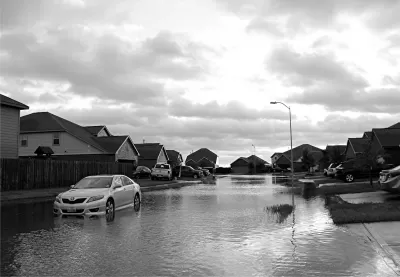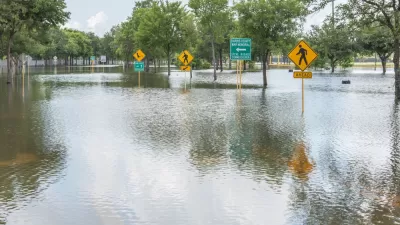The scale of the housing recovery effort means some jobs normally handles by FEMA have fallen to the Texas General Land Office.

In the aftermath of Hurricane Harvey, according to Brandon Formby of the Texas Tribune, "the Federal Emergency Management Agency worried that it didn’t have the capability to handle what was quickly becoming the largest housing recovery effort in American history."
"So [Texas Governor Greg] Abbott tasked the state’s General Land Office with a job that typically falls to FEMA: running short-term housing programs for Harvey victims. That undertaking includes everything from lining up contractors for minor repairs to securing trailers for displaced families."
Abbott has been criticized for waiting three weeks to employ the GLO for short-term housing, but "Abbott, Texas Land Commissioner George P. Bush and FEMA officials touted the unprecedented arrangement as a way to rewrite the nation’s disaster response playbook."
Since then, Formby writes, "initial public optimism has crashed against the reality of trying to re-engineer an already-byzantine process of getting disaster aid to hurricane survivors."
"The state-led plan was raising alarms from federal officials as well. The Department of Homeland Security’s Office of Inspector General said in a Sept. 29 'management alert' that because FEMA still hadn’t developed policies and procedures for the disaster recovery efforts, officials in hard-hit communities had been forced to develop housing plans themselves on a 'disaster-by-disaster basis.'"
In recent weeks, the federal government has promised a billion dollars for Harvey recovery by the first anniversary of the storm, with half of the money available right away.

Alabama: Trump Terminates Settlements for Black Communities Harmed By Raw Sewage
Trump deemed the landmark civil rights agreement “illegal DEI and environmental justice policy.”

Planetizen Federal Action Tracker
A weekly monitor of how Trump’s orders and actions are impacting planners and planning in America.

Why Should We Subsidize Public Transportation?
Many public transit agencies face financial stress due to rising costs, declining fare revenue, and declining subsidies. Transit advocates must provide a strong business case for increasing public transit funding.

Understanding Road Diets
An explainer from Momentum highlights the advantages of reducing vehicle lanes in favor of more bike, transit, and pedestrian infrastructure.

New California Law Regulates Warehouse Pollution
A new law tightens building and emissions regulations for large distribution warehouses to mitigate air pollution and traffic in surrounding communities.

Phoenix Announces Opening Date for Light Rail Extension
The South Central extension will connect South Phoenix to downtown and other major hubs starting on June 7.
Urban Design for Planners 1: Software Tools
This six-course series explores essential urban design concepts using open source software and equips planners with the tools they need to participate fully in the urban design process.
Planning for Universal Design
Learn the tools for implementing Universal Design in planning regulations.
Caltrans
Smith Gee Studio
Institute for Housing and Urban Development Studies (IHS)
City of Grandview
Harvard GSD Executive Education
Toledo-Lucas County Plan Commissions
Salt Lake City
NYU Wagner Graduate School of Public Service





























